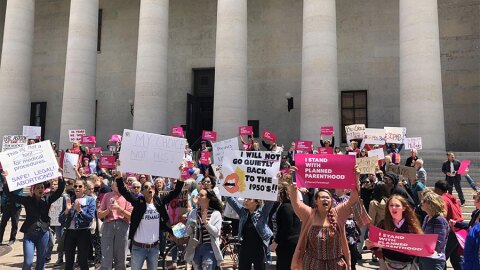Gov. Mike DeWine and Ohio Department of Health director Amy Acton ordered the cancellation of elective surgeries and procedures, with the goal of preserving personal protective equipment like masks, gloves and gowns, and emptying out hospitals for the projected boom in patients.
Acton's order defines which surgeries are essential, instead of trying to classify all the surgeries that are not. The criteria are split into four categories:
- Threat to the patient’s life if surgery or procedure is not performed.
- Threat of permanent dysfunction of an extremity or organ system.
- Risk of metastasis or progression of staging.
- Risk of rapidly worsening to severe symptoms.
But as with other orders from the state about what is “essential” or not, there are a lot of grey areas, even for those in the medical field.
WOSU has received emails from health care workers with concerns that some non-essential surgeries are still being performed.
“People will hear anecdotal things, or they will see a case on the schedule and say that’s something that ought not to occur,” says Bruce Vanderhoff, chief medical officer at Ohio Health. “But they really don’t have the important clinical information behind it.”
Take hernias, for example. Some hernias are a minor nuisance that people can live with for a long time. Others can be so bad they could cause death. But the operation to remove a hernia shows up the same on the surgery schedule.
Of course, there's a lot of debate over where exactly to draw the line.
After complaints from anti-abortion groups, Ohio Attorney General Dave Yost called for abortion clinics to halt surgeries, calling them non-essential.
“If you or your facility do not immediately stop performing non-essential or elective surgical abortions in compliance with the attached order, the Department of Health will take all appropriate measures," wrote Deputy Attorney General Jonathan Fulkerson in a letter to Planned Parenthood of Southwest Ohio.
Abortion providers have pushed back on that, saying abortions are in fact essential, time-sensitive, and in some cases life-saving. DeWine also said that a urology clinic is being investigated for potentially violating the ban.
Central Ohio’s hospitals have a daily review process in place to make sure only essential surgeries are taking place.
General surgeon Bryan Grischow of Mount Carmel says money might be one reason a physician would try and disobey the order.
“It depends on if you’re an employed physician or if you’re in private practice,” he says. “Employed physicians have a little bit of a buffer, you’re receiving a paycheck so you can worry about the workload later on. But people in private practice tend to get a little more nervous in times like this, where your elective case load is dropping and you have an overhead to make.”
Grischow says if they found a physician was still doing elective surgeries, they would be disciplined, or even fired.
Though it’s only been a week since taking effect, the essential surgery order has made a difference. Hospital across the state have seen their capacity fall from 75% to 60%, freeing up beds and PPE.
At Mount Carmel, Grischow says the order has cut the number of surgeries in half. In fact, it’s been so successful that they have a surplus of hospital workers. Some nurses are being called off, or reassigned.
But that won’t last long, he says: This is the quiet before the storm.
Though the order has put hospitals in a better position to prepare for the looming boom in patients, Grischow wonders what financial impact it will have on hospitals-long term.
“Surgeries in general tend to be big revenue generators for hospitals,” Grischow says. “And when you have the largest revenue generators for hospitals, and when you have the largest revenue producing portion of your entity, running at 40-50% capacity, you’re going to feel that impact pretty dramatically.”
Health care professionals also urge: If your surgery was canceled but your symptoms worsen, contact your doctor.





